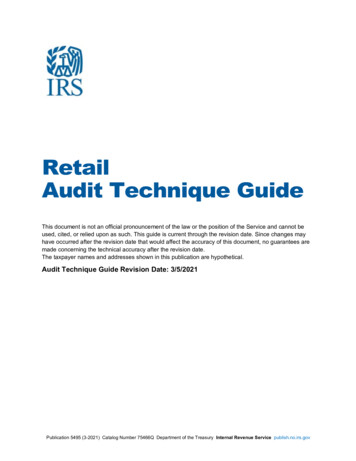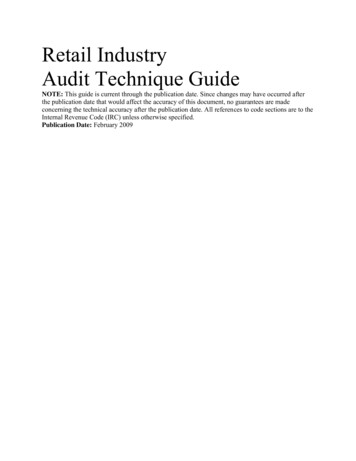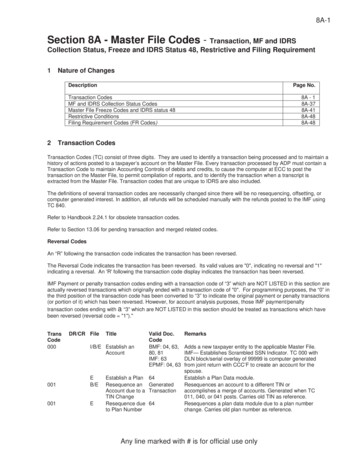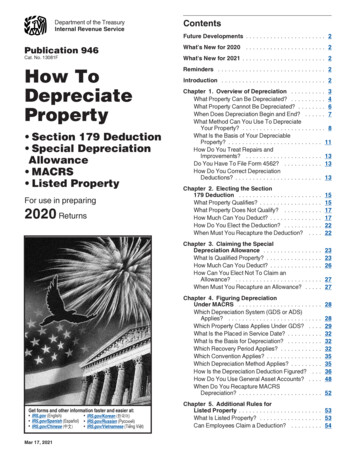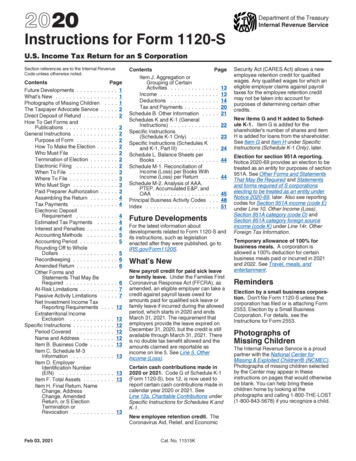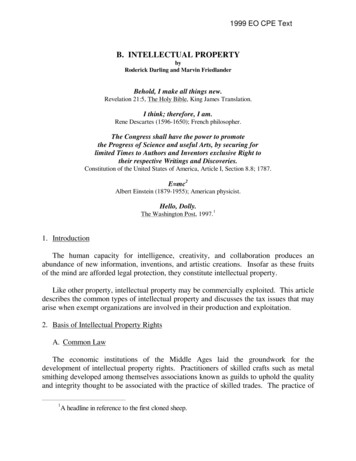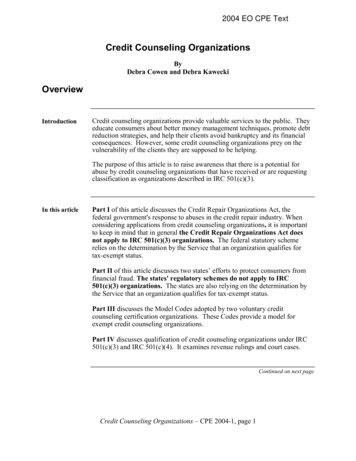
Transcription
2004 EO CPE TextCredit Counseling OrganizationsByDebra Cowen and Debra KaweckiOverviewIntroductionCredit counseling organizations provide valuable services to the public. Theyeducate consumers about better money management techniques, promote debtreduction strategies, and help their clients avoid bankruptcy and its financialconsequences. However, some credit counseling organizations prey on thevulnerability of the clients they are supposed to be helping.The purpose of this article is to raise awareness that there is a potential forabuse by credit counseling organizations that have received or are requestingclassification as organizations described in IRC 501(c)(3).In this articlePart I of this article discusses the Credit Repair Organizations Act, thefederal government's response to abuses in the credit repair industry. Whenconsidering applications from credit counseling organizations, it is importantto keep in mind that in general the Credit Repair Organizations Act doesnot apply to IRC 501(c)(3) organizations. The federal statutory schemerelies on the determination by the Service that an organization qualifies fortax-exempt status.Part II of this article discusses two states’ efforts to protect consumers fromfinancial fraud. The states' regulatory schemes do not apply to IRC501(c)(3) organizations. The states are also relying on the determination bythe Service that an organization qualifies for tax-exempt status.Part III discusses the Model Codes adopted by two voluntary creditcounseling certification organizations. These Codes provide a model forexempt credit counseling organizations.Part IV discusses qualification of credit counseling organizations under IRC501(c)(3) and IRC 501(c)(4). It examines revenue rulings and court cases.Continued on next pageCredit Counseling Organizations – CPE 2004-1, page 1
Overview, ContinuedIn this article,continuedPart V discusses the type of development recommended when considering anapplication for exemption from a credit counseling or credit servicing agency.Part VI is the ConclusionPart VII is the Addendum. The Addendum contains a copy of the CreditRepair Organizations Act and samples of consumer alerts from state attorneysgeneral and the Federal Trade Commission. This information is helpful whenconsidering the distinction between legitimate credit counseling agencies andillegal credit repair services.Table ofcontentsThis article contains the following topics:TopicOverviewPart I: Federal Efforts Protecting Consumers Against FinancialFraud· The Credit Repair Organizations Act· The Federal Trade Commission ActPart II: State Efforts in Protecting Consumers Against FinancialFraudPart III: Voluntary Credit Counseling Agency CertificationPart IV: Qualification for Exemption under IRC 501(c)(3)Part V: Exemption Applications Case DevelopmentPart VI: ConclusionPart VII: Addendum· The Credit Repair Organizations Act· Consumer AlertsCredit Counseling Organizations – CPE 2004-1, page 2See Page13589121621242534
Part I: Federal Efforts in Protecting Consumers AgainstFinancial FraudIntroductionThe Service developed its position on credit counseling agencies in the1960s. If an agency primarily provided information, exemption underIRC 501(c)(3) was considered appropriate. The need to review thissubject stems from recent concern that certain organizations, describingthemselves as educational credit counseling agencies, may be engaged inactivities that are not described in IRC 501(c)(3).This article discusses both credit counseling agencies and credit repairorganizations.·A credit counseling agency educates the consumer as its principalactivity. It may also assist the consumer in consolidating debt andnegotiate between debtors and creditors to lower interest rates andwaive late and over-limit fees.·Credit repair involves claims that the agency can restore credit in ashort period of time. Certain credit repair practices are illegal.The states' attorneys general warn that restoring credit is a lengthyprocedure, and claims to do it quickly may involve identity theftand other illegal practices.The federal statutory scheme and that of many states and privatecertifying organizations rely on the Service's determination that anorganization is exempt under IRC 501(c)(3). If an organization candemonstrate that it is exempt under IRC 501(c)(3), it usually avoids allregulatory requirements.Because the Service's determination of exemption is central to bothfederal and state regulatory enforcement programs, the determinationspecialist must examine applications for exemption with a heightenedawareness. The following discussion and the development questions aredesigned to review the published guidance in light of changes in the fieldof credit counseling and credit repair.Credit Counseling Organizations – CPE 2004-1, page 3
Part I: Federal Efforts in Protecting Consumers AgainstFinancial Fraud, ContinuedFederalLegislationThe Federal Trade Commission enforces at least two statutes that apply tothe activities of credit counseling and credit repair organizations.·The Credit Repair Organizations Act became effective on April 1,1997, and is directed to the credit repair industry.·The FTC Act, a statute of more general application, applies to theoperations of both credit repair organizations and credit counselingorganizations.Bankruptcy reform legislation was proposed in 2002 and remains aconcern of Congress. Under the proposals that were considered, the roleof credit counseling organizations in the bankruptcy process would besignificantly enhanced.·The proposed legislation provided that an individual may not file apetition for bankruptcy under Chapter 11 of the Bankruptcy Codeunless he has sought assistance from an approved nonprofit budgetand credit counseling agency. The United States trustee orbankruptcy administrator in each judicial district would berequired to compile a list of approved credit counseling agencies.·In the event similar legislation passes, there is likely to be aninflux of new nonprofit credit counseling organizations setting upbusiness across the country and seeking exemption under IRC501(c)(3).Credit Counseling Organizations – CPE 2004-1, page 4
Part I: Federal Efforts in Protecting Consumers AgainstFinancial Fraud - The Credit Repair Organizations ActIntroductionCongress has taken steps to protect citizens against the worst of the creditrepair scams in the Credit Repair Organizations Act, [15 U.S.C. §§ 1679 etseq.] The Act seeks to ensure that prospective buyers of credit repair servicesare provided with the information necessary to make an informed decision,and to protect the public from unfair or deceptive advertising and businesspractices by credit repair organizations.Definition of aCredit RepairOrganizationThe Act defines a credit repair organization as:any person who uses any instrumentality of interstate commerce orthe mails to sell, provide, or perform (or represent that they will sell,provide, or perform) any service, in return for the payment of moneyor other valuable consideration, for the express or implied purpose of (i) improving any consumer's credit record, credit history, or creditrating; or(ii) providing advice or assistance to any consumer with regard toany activity or service in clause (i).The Act excludes from the definition of a credit repair organization:·any nonprofit organization which is exempt from taxationunder IRC 501(c)(3).This strong federal expression of consumer protectioncan be defeated by an erroneous determination that anorganization is exempt under IRC 501(c)(3). It iscrucial, therefore, that the Service make every effort toadequately develop all the facts and circumstancesregarding an applicant's operations.Continued on next pageCredit Counseling Organizations – CPE 2004-1, page 5
Part I: Federal Efforts in Protecting Consumers AgainstFinancial Fraud - The Credit Repair Organizations Act,ContinuedFull disclosureWrittenContractThe Act requires full disclosure regarding consumer rights before anycontract for credit repair services is executed. A written statement mustbe provided and signed by all prospective customers, and must be retainedby the credit repair organization for at least two years after the statementis signed. Consumers must be advised:·They may dispute inaccurate information in their credit reportby contacting the credit bureau directly.·There is no right to have accurate, current, and verifiableinformation removed from a credit report unless it is over sevenyears old. Bankruptcy information can be reported for ten years.·They have a right to sue a credit repair organization thatviolates the Credit Repair Organizations Act.·They have the right to cancel a contract with any credit repairorganization for any reason within three business days from thedate it was signed.A written contract is also required and must:1. specify the terms and conditions of payment, including the totalamount of all payments to the credit repair organization or anyother person2. contain a full and detailed description of the services to beperformed by the credit repair organization for the consumer,including:(A) all guarantees of performance; and(B) an estimate of the time required for the performance of theservices3. contain the credit repair organization's name and principalbusiness addressContinued on next pageCredit Counseling Organizations – CPE 2004-1, page 6
Part I: Federal Efforts in Protecting Consumers AgainstFinancial Fraud - The Credit Repair Organizations 4. contain a conspicuous statement in bold face type, in immediateproximity to the space reserved for the consumer's signature on thecontract, which reads as follows: "You may cancel this contractwithout penalty or obligation at any time before midnight of the3rd business day after the date on which you signed the contract.See the attached notice of cancellation form for an explanation ofthis right."The statutory scheme provides further protection for consumers with a listof prohibitions. The Act prohibits credit repair organizations, as well astheir employees and agents, from:·misrepresenting the organization's services·making or enticing consumers to make untrue or misleadingstatements either to the credit reporting agencies or to the consumer'screditors·advising consumers to attempt to change their credit identities·accepting payment or other valuable consideration for theirservices in advance of fully performing those services.Civil PenaltiesThe Act includes civil penalties for violations and procedures foradministrative enforcement by both the FTC and the states.Waiver ofRightsA consumer cannot waive his rights under the Act.·Any waiver of any protection afforded by the Act is treated as void,and contracts that are not in compliance with the Act's provisions maynot be enforced by any federal or state court.Credit Counseling Organizations – CPE 2004-1, page 7
Part I: Federal Efforts in Protecting Consumers AgainstFinancial Fraud – The Federal Trade Commission ActThe FederalTradeCommissionActThe FTC Act [15 U.S.C. §§ 41 et seq.] is a statute of more generalapplication than the Credit Repair Organizations Act. It prohibits "unfairor deceptive acts or practices in or affecting commerce." This generalproscription applies to the operations of both credit repair companies andcredit counseling agencies. It is not clear, however, whether IRC501(c)(3) organizations will come under the FTC Act enforcementumbrella.Credit Counseling Organizations – CPE 2004-1, page 8
Part II: State Efforts in Protecting Consumers AgainstFinancial FraudStateLegislativeAction:CaliforniaCalifornia is just one example of the many states that have taken steps toprotect consumers against the worst of the credit repair scams. In 1993, theCalifornia legislature imposed strict standards on credit service organizationsand the credit repair industry. The Act, (Civ. Code §§ 1789.12, 1789.16),provides prospective buyers of credit repair services with the informationnecessary to make an intelligent decision regarding the purchase of thoseservices. It aims to protect the public from unfair or deceptive advertisingand business practices. It defines credit services organizations (also known as"CSOs" or "credit repair services") as organizations that promise any of thefollowing services for a fee to:1. improve a buyer's credit record, history, or rating2. obtain a loan or other extension of credit for a buyer3. provide advice or assistance to a buyer with regard to either of theabove.CSORequirementsThe Act requires a CSO to register with the California Attorney General'sOffice and obtain a 100,000 surety bond before starting to do business inthe state. The CSO must give each prospective client an informationstatement and a written contract spelling out its services before providingany services, and must complete all services within six months.ProhibitionsThe statutory scheme provides further protection for consumers with a listof prohibitions. The most important of these is that CSOs are not allowedto charge "up-front fees." All services must be completed before any feecan be collected. The Act also prohibits a CSO from:1. charging referral fees for referral to other agencies if the creditterms offered are substantially the same as those available to thegeneral public, or are the same as the buyer could have obtainedwithout the CSO's assistanceContinued on next pageCredit Counseling Organizations – CPE 2004-1, page 9
Part II: State Efforts in Protecting Consumers Against Financial Fraud,ContinuedProhibitions,continued2. encouraging a buyer to make false or misleading statements to aconsumer credit reporting agency, or to any present or potentialcreditor, for the purpose of improving his credit rating3. advising a buyer to create a new credit record by using a newname, address, social security number, or employee identificationnumber4. engaging directly or indirectly in any course of business thatwould operate as a fraud or deception upon any persons inconnection with its servicesCivil andCriminalPenaltiesThe Act includes criminal and civil penalties for violations. The state attorneygeneral, district attorneys, and city attorneys may prosecute any violation as amisdemeanor and may also seek injunctive relief. In addition, a buyer who isinjured by a CSO's violation of the Act or breach of contract may recoveractual damages at least equal to the amount paid to the CSO, plus costs andreasonable attorneys' fees. He also may seek injunctive relief and may beawarded punitive damages.The Act DoesNot Apply toIRC 501(c)(3)Organizations:The Act does not apply to:·certain individuals and institutions that are already regulated. Theseinclude: licensed and regulated lenders or creditors; FDIC-insured banksand savings institutions; licensed proraters and real estate brokers;licensed attorneys who are not directly affiliated with a CSO; and brokerdealers who are registered with the U.S. Securities and ExchangeCommission.·Most significantly, the Act does not apply to nonprofit organizationsthat have received a final determination from the Service that theyare exempt under IRC 501(c)(3) and are not private foundations.Continued on next pageCredit Counseling Organizations – CPE 2004-1, page 10
Part II: State Efforts in Protecting Consumers Against Financial Fraud,ContinuedCalifornia IsNot AloneWe have not done a state-by-state survey of consumer protection schemes.California and the states included in the Addendum are representative of whatis happening as states awaken to the nationwide problem within the debtconsolidation/credit repair industry. The states are leading the way byidentifying the worst of the abuses as well as adopting legislation to regulatethe industry.Knowledge of the latest applicable state laws and licensing regulations willhelp determination specialists distinguish educational credit counselingorganizations from credit repair organizations that may be performingactivities that are not charitable.Credit Counseling Organizations – CPE 2004-1, page 11
Part III: Voluntary Credit Counseling Agency CertificationModel CodesThe Model Codes described in this section are voluntary. We discuss themhere because they provide a model for exemplary credit counselingorganizations and are helpful in guiding the development and consideration ofapplications for exemption under IRC 501(c)(3).NationalFoundation forCreditCounseling(NFCC) A Model CodeThe National Foundation for Credit Counseling (NFCC) is an independentnot-for-profit organization dedicated to establishing voluntary standards forthe credit counseling industry. The NFCC Council on Accreditation (COA) isan independent not-for-profit organization. COA accredits over 4,000programs throughout the United States and Canada, including nearly 200credit counseling services. An organization need not be a member of theNFCC to be accredited by COA. Once an agency is accredited, COA certifiesthat the agency uses the appropriate checks and balances to protect theconsumer.OnlyBefore even being considered for accreditation by the COA, a creditcounseling agency must meet certain minimum requirements:IRC 501(c)(3)OrganizationsMay BeAccredited·must be exempt under IRC 501(c)(3)·services must be provided according to best practice standards·all applicable licenses required by the state and locality in which itoperates must be secured·the agency must have operated for at least one year·the agency must be an organization. Individuals are not eligible forcertification.Continued on next pageCredit Counseling Organizations – CPE 2004-1, page 12
Part III: Voluntary Credit Counseling Agency Certification, ContinuedThe BestPracticeStandardsRequired byCOAThe best practice standards required by COA include:·The agency must have its operating and trust accounts audited annually.·The agency must be licensed, bonded and insured.·The agency must support and deliver a variety of consumer educationprograms.·The agency must meet all consumer disclosure requirements as set forthby the U.S. Federal Trade Commission.·Client debt management plans must include a detailed review of currentand prospective income, as well as present and anticipated financialobligations. In addition, the plan must represent the client’s best effort inpayment of all debts, and assure that all lines of credit are closed.·Funds are disbursed at least twice per month, and funds are disbursedpromptly in emergencies.·An agency discontinues a client's debt management plan after twoconsecutive missed payments and notifies the creditor of thisdiscontinuation within 10 days.·Creditors receive fair and equitable distribution of funds, and the agencyoffers electronic funds transfer to those creditors that request it.·Clients have a variety of deposit options including electronic methods,and are offered immediate correction of improper postings.·Persons with immediate needs are served immediately or referred toanother organization for immediate service.·Each consumer receives an assessment of how he/she got into financialtrouble, a comprehensive financial plan, and a written action plan.·Clients receive (at minimum) a quarterly statement.·Clients are encouraged to increase deposits if their financial situationimproves so they may speed the liquidation of their debt.Continued on next pageCredit Counseling Organizations – CPE 2004-1, page 13
Part III: Voluntary Credit Counseling Agency Certification, ContinuedAssociation CA)The Association of Independent Consumer Credit Counseling Agencies(AICCCA), another national membership organization established to promotequality and consistent delivery of credit counseling services, has also adoptedindustry standards. The standards are similar to those adopted by the NFCCand are voluntary.AICCAStandardsSome of the standards adopted include:OnlyIRC 501(c)(3)OrganizationsMay B
The Credit Repair Organizations Act became effective on April 1, 1997, and is directed to the credit repair industry. The FTC Act, a statute of more general application, applies to the operations of both credit repair organizations and credit counseling organizations. Bankrup




